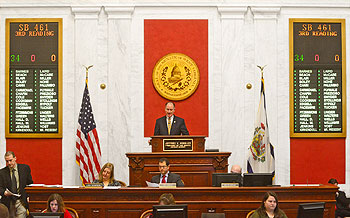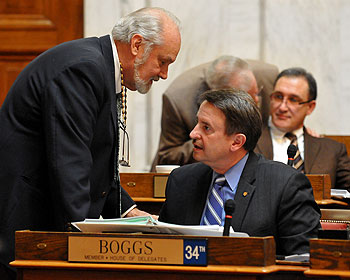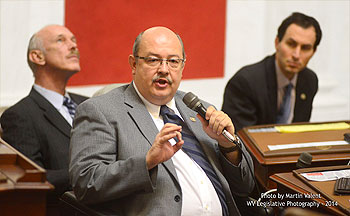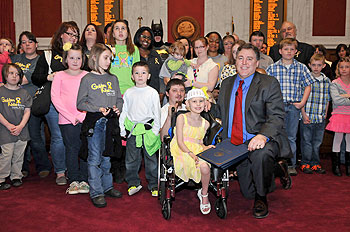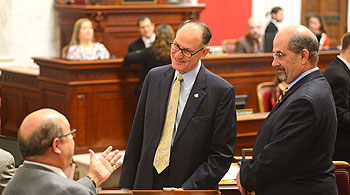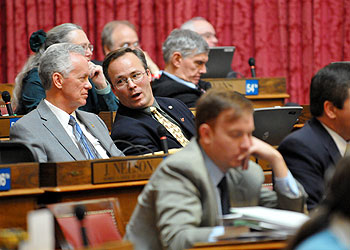As of 4 p.m., Thursday February 13, 2014, the 37th day of the 2nd session of the 81st Legislature, 1239 bills have been introduced in the House. Of those, 60 have passed and have been sent to the Senate for further consideration. Among those:
House Bill 4149 would allow members of the Board of Public Works to be represented by designees and to vote by proxy.
House Bill 4188 would update the authority and responsibilities of the Center on Nursing. It would permit the administration of financial aid and higher education scholarship programs by the Higher Education Policy Commission, move the Center for Nursing special revenue account to the Higher Education Policy Commission, and update provisions on the account. It would also give them the responsibility to establish a statewide strategic plan to address West Virginia’s nursing shortage, establish and maintain a website, evaluate the capacity for expansion of nursing programs, and administer the financial aid program. The board of directors would be reorganized.
House Bill 4257 would make it a misdemeanor for a person, firm, corporation or association to willfully spread false information during a state of emergency, including using an automated telephone call to do so.
House Bill 4298 would change the experience requirements of composition of the members of the West Virginia Ethics Commission. It would change certain aspects, requiring one member to have served in the West Virginia Legislature, one member employed to have been employed in a full-time elected or appointed office in state government, one member to have served part time as a member or director of a state, county or municipal board, commission or public service district, and seven members from the public at large.
House Bill 4301 would allow the reciprocal use of migratory bird hunting and fishing licenses with the Commonwealth of Kentucky on the Big Sandy and Tug Fork Rivers.
House Bill 4302 would allow the use of county election officials to conduct elections and designate the county commission as the board of canvassers to canvass the returns of all elections for public school purposes.
House Bill 4309 would allow a person to keep a firearm in his or her vehicle on State Capitol Complex grounds if the vehicle is locked and the firearm is out of normal view.
House Bill 4343 would create the West Virginia Project Launchpad Act. The Governor would designate 10 “launchpads” that would meet the criteria where certain businesses and individuals are eligible for certain tax benefits.
House Bill 4347 would create an affirmative defense to a mechanics’ lien if a payment has been made to the contractor or subcontractors. This would only apply to work on owner-occupied, single-family dwelling units.
House Bill 4349 would clarify that retirement dependent child scholarship and burial benefits of deceased uniformed service officers are not subject to division or payable to another payee under a Qualified Domestic Relations Order.
House Bill 4384 would require teachers of students with exceptional needs to be present at an individualized education program meeting or read and sign a copy of the program plan.
House Bill 4394 would change the process for employing highly qualified professional personnel in public schools. It would ensure that positions filled by retirees and not fully qualified teachers are posted statewide and easily available to new graduates, reducing force teachers seeking employment, allow capable teachers to easily obtain certification in additional content areas, ensure teachers and principals consider applicant qualifications, and limit the movement of personnel to other counties when instruction in an assigned position is about to or has begun.
House Bill 4431 would clarify that possession of a firearm, hunting dogs or other indications of hunting does not also require a hunting license.
House Bill 4453 would make Supplemental Security Income exempt from being considered income for child support awards purposes. It would also increase the percentage variance used for determining when a motion to modify child support should be filed from 10 percent to 15 percent.




